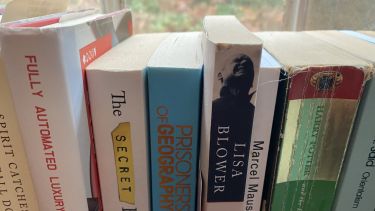‘Like a warm hug': Attending the ECR methods and methodologies symposium
Gareth Bramley reflects on this iHuman symposium

‘Like a warm hug: attending the ECR methods and methodologies symposium’
By Gareth Bramley
I decided to attend the ECR symposium held by the School of Education on 23 November as I am currently undertaking an EdD at the University of Sheffield, School of Education. I must admit I felt some initial trepidation, and no small amount of imposter syndrome when I first read the advert sent over email (feelings I am getting more comfortable with, since engaging in doctoral study) - would the audience laugh me out of the room?; would I be able to articulate at all what I wanted to speak about?; did I have anything worth saying?
In terms of actually biting the bullet, I was persuaded by the advert for the event - it described a friendly and inclusive atmosphere and a dialogue being encouraged. Given my experience of the School of Education in general at UoS, I really trusted this blurb and was spurred on to submit an abstract. Like many things ‘extra’ within a busy work and life schedule, I nearly talked myself out of submitting an abstract because of the perception that ‘I didn’t have the time’. It is at those moments that I remember the recent book I read, ‘4000 week - time management for mortals’ by Oliver Burkeman; after all, nobody has time for almost everything in life, so perhaps focusing on the potential value received through engaging in this symposium was the way to go!
Luckily, I also could draw on my EdD thesis proposal - having just started Part 2 (the thesis stage) of this programme, I had a formative section from my proposal on a proposed methodological approach I was considering. So, once that was adapted for a short abstract, my main remaining fear was trying to explain with any credibility or sense what ‘post qualitative research’ actually means for my research proposals.
I was firstly buoyed by having my abstract accepted - it was a nice feeling, together with the really positive remarks received from the event organisers. A great first step - now to not embarrass myself on the actual day!
So, to the day itself. Although I have stood on my feet and spoken many times before, I always get pre-match nerves, particularly with an audience and area that still feels outside my comfort zone. However, I couldn’t have wished for a warmer reception from the other attendees, as well as from Louise and Lauren, when I entered the event space - everyone was genuinely lovely, and I felt a lot more comfortable saying my piece (and this was even though I was going first!). My presentation itself was a little jumbled and garbled (in hindsight, some short slides could have been helpful), but that was partly down the nature of the topic - after all, ‘post qualitative research’ is intentionally vague and undefined (which is often what brings about its critique, and is what makes me consider carefully in what way to use it, or be inspired by it).
To my surprise and relief, the audience not only appeared to know what I was talking about, but also had a number of really insightful remarks, provocations and productive suggestions to make to me. I walked back to my seat feeling like I had just received a warm hug…not only did I not regret it, but it made me want to join this ECR community for future events.
The rest of the morning involved listening to, and interacting with, some fantastic presentations and topics. Not only did this provide me with additional considerations for my own research, but I felt a strong sense of encouraging these other presenters to continue their efforts, and further to continue to communicate their research interests wherever they could.
So, for others having the same, or similar, thoughts to myself about whether to engage in similar events going forward I would say ‘go for it’ - I strongly believe you won’t regret it (it is not good to regret, after all!), and moreover I feel it will make you feel more positive about the possibilities of collective discussion and support. My own research interests often focus on the possibilities for collectivism, and how often this is missed in the dominant discourse of the ‘self sufficient individual’ - as one of the other presenters noted, none of us are invulnerable and we need each other in multifaceted ways. My belief is that this symposium is a shining example of the power of collectivism.

iHuman
How we understand being ‘human’ differs between disciplines and has changed radically over time. We are living in an age marked by rapid growth in knowledge about the human body and brain, and new technologies with the potential to change them.
